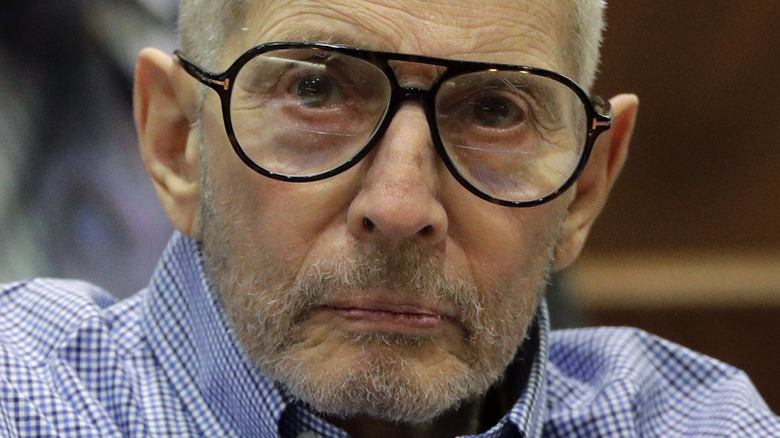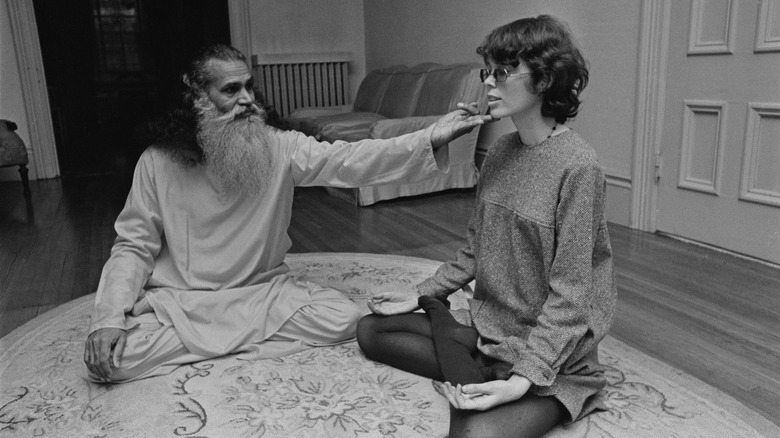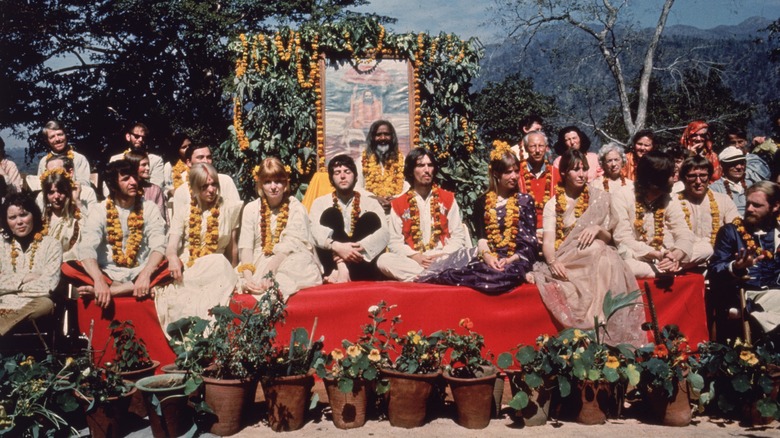What Happened Between Robert Durst And Mia Farrow's Sister?
More than 20 years after committing the crime, real estate heir Robert Durst was found guilty of killing his close friend Susan Berman in December 2000. In September, the jury convicted Durst, subject of HBO's 2015 docu-series "The Jinx," of murdering Berman to keep her from talking to authorities who were reinvestigating the disappearance of his wife, Kathleen McCormack, in 1982, the BBC reported.
While Berman's family recently found some much-need closure, McCormack's never did. Since going missing nearly four decades ago, the 29-year-old medical student remains unaccounted for. During his trial, Durst denied killing Berman, claiming he was only responsible for finding her body in her Los Angeles apartment, according to CBS News. He also denied killing Kathleen, also known as Kathie, or knowing anything about her diamond earrings, which he previously told authorities she was wearing when she went missing, though they were found in her drawer, Fox News reported. "Thinking about that makes my skin crawl. The answer is no. I did not kill my wife. I did not take her earrings," Durst said in response to the prosecutor's questions.
While Durst denied a great deal in trial, he also admitted to quite a few things. One of his admissions involved Prudence Farrow, who inspired the Beatles's song "Dear Prudence" and who is the younger sister of Mia Farrow and the daughter of actor Maureen O'Sullivan (of "Tarzan" fame) and film director John Farrow. Keep reading to learn how Prudence became embroiled in Durst's highly publicized trial.
Robert Durst claimed he was having an affair with Prudence Farrow
Robert Durst said during trial that he had an affair with Prudence Farrow before Kathleen disappeared, Fox News reported. He disclosed that the relationship had been a point of tension between he and his wife, who had found out about it, the report detailed. "You wanted to pursue a relationship with Prudence by your own statement. Kathie did not want you to pursue a relationship with Prudence. And I'm asking you how did that get resolved?" Deputy District Attorney John Lewin asked, according to a clip shared by Law & Crime Network. Durst's response was succinct. "Kathie disappeared," Durst said in the same clip.
In 1982, a college friend of Kathie's, Eleanor Schwank, told the New York Post that Farrow called Kathie two months before she disappeared, the publication noted in 2015, a fact that Durst denied having knowledge of in court. "Prudence wanted Kathie to give Bob up," Schwank said. According to the outlet, Farrow and Durst had allegedly been having an affair for three years when Kathie disappeared.
Farrow was also married at the time and reportedly lived in one of the properties owned by the Durst family, per the report. According to Marion Collins, author of "Without a Trace," Kathie was upset over his relationship with Farrow. "[H]e was thrilled to be dating the woman who had been the inspiration for his idol John Lennon's song 'Dear Prudence.' He'd told Kathie all about it," she wrote.
Prudence Farrow became a Beatles muse by chance
More than a decade before she allegedly had a love affair with convicted killer Robert Durst, Prudence Farrow flew halfway across the world in search of enlightenment. In February 1968, Farrow, then 20, arrived at the Maharishi Mahesh Yogi's ashram in India, where the Beatles were also deepening their spiritual learning, per the book "The Girl in the Song." But Farrow took her studies a bit far, retreating into her meditation room for weeks on end, the authors detailed. Her friends began to worry about Farrow's behavior, and that's how the Beatles got involved.
According to the book, her friend asked the popular musicians to sing to Farrow as an attempt to get her to come out of her chalet. "All the people around her were very worried because she was going insane ... so we sang to her. They selected me and George [Harrison] to try and bring her out because she would trust us," John Lennon is quoted as saying. He added that they managed to coax her out of the room after she had spent three weeks locked inside.
However, Farrow denied she had gone "completely mental," as Lennon put it, though she admitted being somewhat "fanatical." "John, George and Paul would all want to sit around jamming and having a good time and I'd be flying into my room. They were all serious about what they were doing, but they just weren't as fanatical as me," Farrow said.



